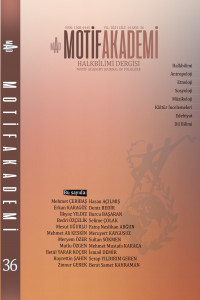KUZEY MAKEDONYA CUMHURİYETİ’NİN GOSTİVAR ŞEHRİ’NDE YAŞAYAN TÜRKLERİN İCRA ETTİKLERİ DÜĞÜN TÜRKÜLERİ
WEDDING FOLK SONG PERFORMED BY TURKS WHO LIVING IN GOSTIVAR, REPUBLIC OF NORTH MACEDONIA
Author(s): Mesut UğurluSubject(s): Customs / Folklore, Music, Regional Geography, Culture and social structure
Published by: Motif Halk Oyunları Eğitim ve Öğretim Vakfı
Keywords: North Macedonia; Gostivar; Turkish oral culture; Turkish folklore; folk songs; wedding folk songs;
Summary/Abstract: The Republic of North Macedonia existed as a great empire for a period in history. The country, which existed for many years under the auspices of the Ottoman Empire in the Middle Ages, continued its existence for a while under the auspices of the Kingdom of Yugoslavia and then the Socialist Federal Republic of Yugoslavia as a result of the withdrawal of the Ottoman Empire from the region in the Balkan wars. Macedonians, Albanians and Turks are the largest ethnic group elements of the country, which has a function as a “state” in the citizenship of different ethnic groups under the name of the Republic of North Macedonia since 2019. These peoples, who have lived together in the same geography for centuries, have succeeded in preserving their own cultures, although they have been influenced by each other. The Turks, who have faced great difficulties especially in the last century, have succeeded in preserving their religion, language and culture despite all this troublesome process. Although many studies have been carried out on the oral cultural heritage of the Turks, who have managed to keep their folk literature elements alive as much as possible, field work has been carried out to compile the oral cultural products of the Turks living in the region, based on the idea that there may be folk culture products that have not been compiled yet. Within the scope of the study carried out with the support of TÜBİTAK, interviews were conducted with Turks who living in the city of Gostivar in the Republic of North Macedonia, they were asked to perform Turkish songs, and many previously unrecorded folk songs were identified. Of these folk songs that were performed before and/or during the wedding traditions, they were brought together and presented within the scope of this article with their structural and thematic analysis.
Journal: Motif Akademi Halkbilimi Dergisi
- Issue Year: 14/2021
- Issue No: 36
- Page Range: 1265-1276
- Page Count: 12
- Language: Turkish

